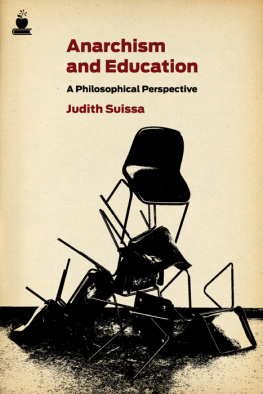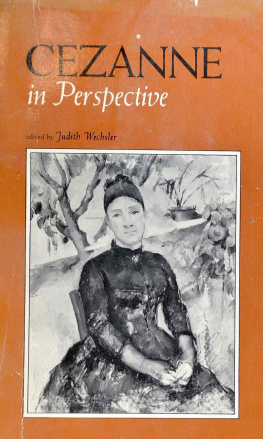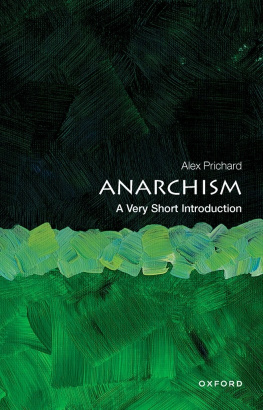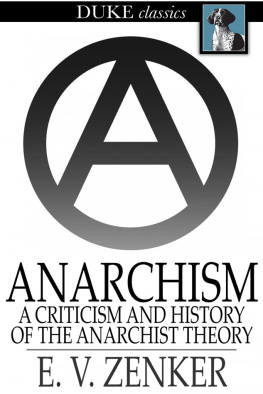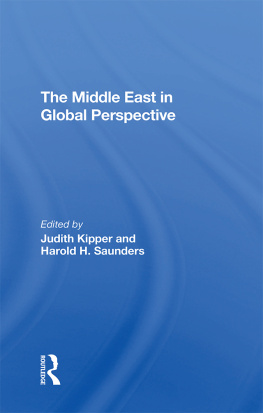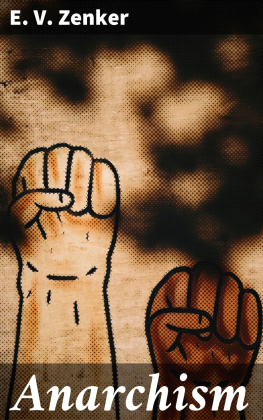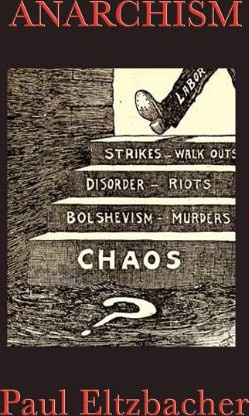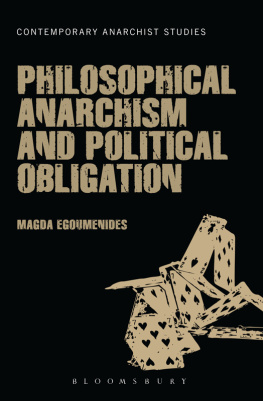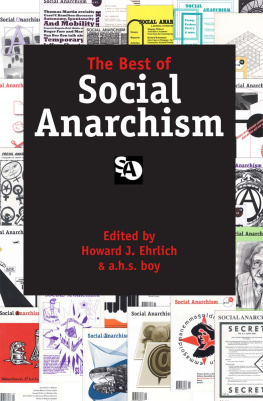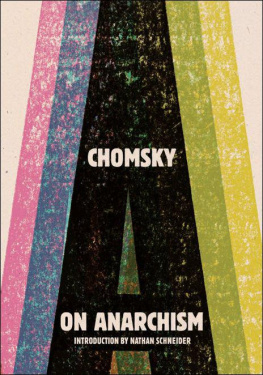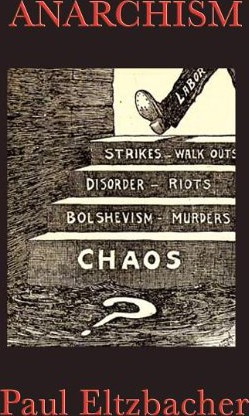Anarchism and Education: A Philosophical Perspective Judith Suissa
This edition PM Press 2010
All rights reserved. No part of this book may be transmitted by any means without permission in writing from the publisher.
First published 2006 by Routledge, an imprint of the Taylor & Francis Group 2006 Judith Suissa
ISBN: 978-1-60486-114-3
Library of Congress Control Number: 2009912425
Cover by John Yates
10 9 8 7 6 5 4 3 2 1
PM Press
PO Box 23912
Oakland, CA 94623
www.pmpress.org
Printed in the USA on recycled paper.
Preface
It is nearly five years since the first publication of this book. Reflecting on the work that went into it, and on the discussions that it has prompted with friends and colleagues over the years, there are two points that I would like to make in this preface to the new edition. These concern both the past and the future: the things I said in the book and why I still feel they are important; and the things that were left unsaid that need to be written and, more importantly, acted on.
Firstly, the past: For much of the time I spent researching the book, I was buried in, and entranced by, the world of nineteenth-century social anarchists. Sitting in silent archives, rummaging around second-hand bookshops, retracing the steps of Kropotkin in the East End of London and of Francesco Ferrer in the streets of Barcelona, it was easy to get lost in this world, where so much seemed possible. So it comes as no surprise to have been accused, by some readers of the book, of being romantic or utopian. Yet, annoying though these accusations are, I am not entirely uncomfortable with the label. As I tried to show in the book, engaging with anarchist theory and, particularly with anarchist educational ideas and practice, can help to rescue the word utopian from its pejorative connotations and reclaim it as an urgent and committed form of social hope. This project seems particularly timely in our current political climate. Ideas matter, and at a time when we are surrounded by pronouncements about the death of ideology and politicians talking about what works, they matter more, not less, than ever. If, as Susan Neiman has argued (Neiman 2009: 26), one goal of philosophy is to enlarge our ideas of what is possible, then a philosophical exploration of anarchism is surely a valuable exercise. Indeed, as Neiman shows, one of the effects of contemporary political discourse has been to blur the very distinctions between our core metaphysical concepts: ideals and ideology; realism and pragmatism; what is actual and what is possible. Part of the battle to resist neo-liberal ideology and its effects on our lives is a battle to reclaim our ethical vocabulary. I hope that in showing how, for example, the notions of freedom and equality were conceptually intertwined in the thought and political activism of nineteenth-century social anarchists, I can play a small part in this battle.
When it comes to education, articulating and engaging with anarchist positions takes on a particular significance. I am still compelled to draw peoples attention to anarchist educational ideas and practice both because the role of education in anarchist theories of social change and human nature is still seriously overlooked in theoretical work on anarchism, and because the unique intellectual roots and political underpinnings of anarchist educational practice are largely left out of philosophical and historical work on education. Yet my urge to tell the story of anarchist education stems from more than a desire to correct theoretical misrepresentations or to fill gaps in the academic literature. We live in a time when educational policy makers in the USA and the UK often talk as if state education had no history. Terms like parental choice, child-centred and educational opportunity are scattered across policy documents as if their meaning is straightforward and unproblematic, and the political assumptions underpinning them are rarely made explicit. But as Michael Apple has argued (Apple 2000, 2006), the forces of conservative modernization, while reconstructing the means and ends of education and other social institutions, are also creating a shift in our ideas about democracy, freedom, equality and justice, turning thick collective forms of these (always contested) concepts into thin consumer driven and overly individualistic forms. This tendency needs to be resisted if we are to create and sustain the kinds of learning environments and the kinds of just societies where children and adults can truly flourish. Confident statements are made, in the media, in policy documents and in academic literature, about the aims and benefits of state schooling and liberal education as if there was no need to even ask ourselves what these things mean, what values underpin them, and why they have taken on the institutional forms and structures that they have, or to remind ourselves that things were not always thus. Revisiting the educational ideas of anarchist theorists and practitioners forces us to step back and ask these questions; to remind ourselves that there were times where not just the link between the state and education, but the state itself, was contested. But thinking about how our political structures and the educational processes and relationships that inform and are informed by them could look radically different is not just a historical exercise: it is an important reminder that there are other ways of doing things; that even now, within and alongside the structures of the state, it is possible, as Buber says, to create the space now possible for different human relationships; different ways of organizing our social and political lives.
And this brings me to the final point: the book I didnt write and the things I didnt say. For, when all is said and done, the writing of this book and the research that went into it was an intellectual endeavour. I make no apologies for being an academic, for I do believe that thinking about the world, particularly thinking critically about it, is an essential part of changing it. However, the real story of anarchist education is still going on, outside the pages of this book. It is unfolding in the nondescript classrooms of under-resourced inner-city schools; in the leafy grounds of independent schools; in grimy youth-clubs; on the streets; in theatre-halls and in seminar rooms. Since the first publication of the book, I have been contacted by countless activists and teachers who, in one way or another, are practising, experimenting with and developing various forms of anarchist education: through street theatre; through anti-racist, feminist and critical pedagogy; through the founding and running of experiments in collective living; through innovative approaches to art education, sex education, political action against oppression, community projects, and numerous other initiatives that challenge dominant mind-sets and political structures and form part of the ongoing chorus of what Colin Ward called voices of creative dissent. If there is a hope expressed in this book, it is these activists and educators who give it substance and who are, at this very moment, writing its sequel.
I dedicated the original edition of this book to the memory of my mother, Ruth. I would like to dedicate this new edition to the memory of Colin Ward. They both, in their different ways, have inspired me and will continue to do so.


